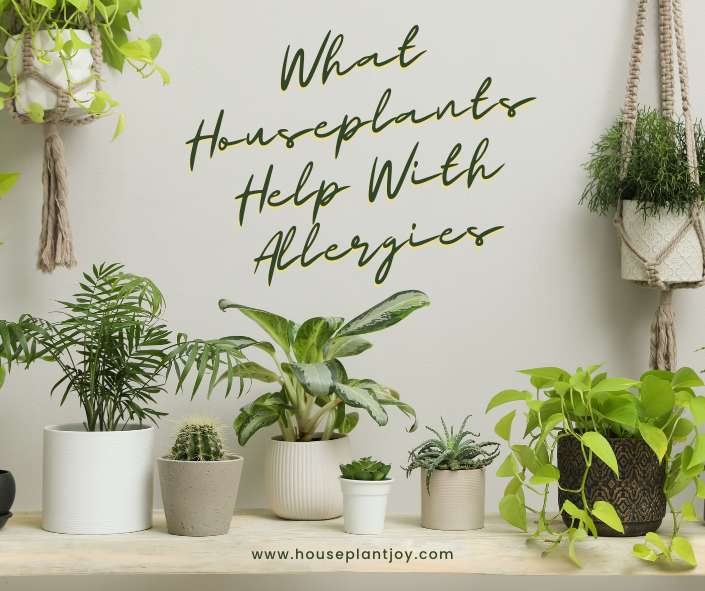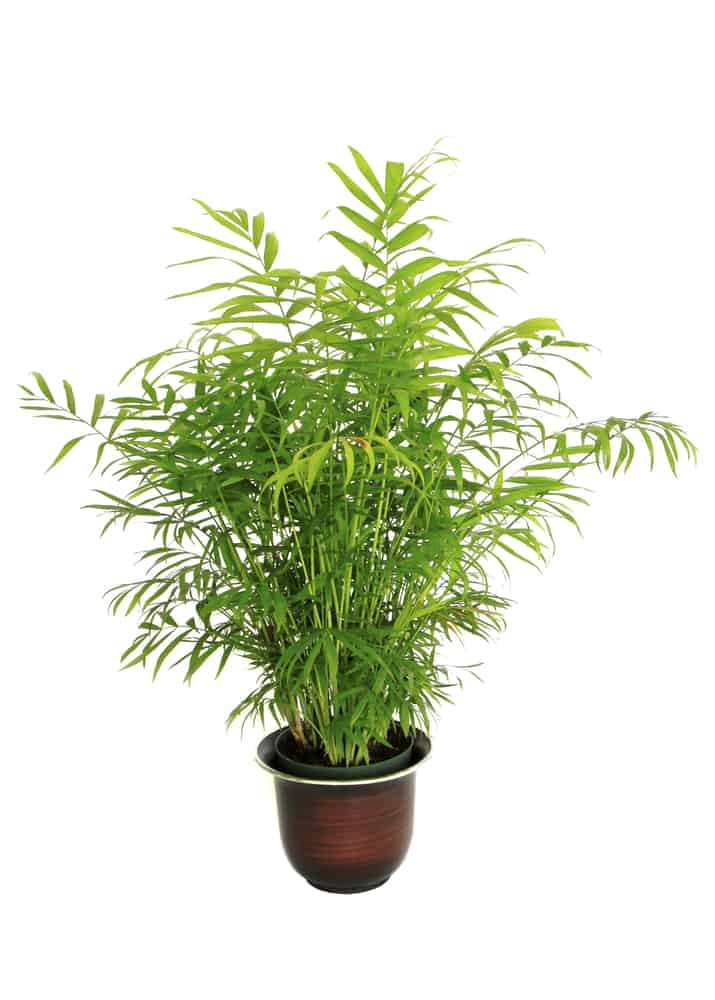HousePlantJoy is supported by our audience. When you purchase through one of our links, we may earn a small affiliate commission. As an Amazon Associate I earn from qualifying purchases. Your cost is not affected.
==================
What Houseplants Help With Allergies
Like super air-cleaners, some houseplants help with allergies. They work to clean the air in your home, especially house plants for allergies. Yes, some excel at removing annoying chemical residues and other irritants. A NASA study of 1989 found that some plants, including house plants for allergies, filter indoor air pollutants such as tobacco smoke, benzene, and formaldehyde.
However, please note that no tests have been carried out on plants‘ “ability to regulate air quality in vacuum, space or places outside the normal air exchange of the Earth. Still, the EPA agrees that the known information is quite impressive.
What Do I Know About How Houseplants Help With Allergies?
Quite a bit, actually. You see, our family members live with several allergies. Some are food-related, others plant and environmental. As a Mom who prefers natural methods whenever possible, I set out to research how to help my children with these allergies. I avoid certain foods in our family meals for the food issues. And we don’t keep plants nearby that cause plant allergens to infect those with plant allergies.
But indoor air still requires a little extra help in terms of house plants good for allergies, especially for conditions like allergic rhinitis. Enter…our family plants! These are carefully chosen to help, not hinder, the air quality for our entire family. In total fairness, we also do a lot of extra cleaning and use good air filters in our air conditioning units. And since our home is quite large, we also have a couple of room-sized air purifiers. I hope to replace them with more plants in time, too!
Not All Houseplants Are Beneficial, However
Remember that some plants excel at improving indoor air quality, but have a high pollen count. This makes them terrible for most allergy sufferers. However, consider the best indoor plants for purifying the air. Then, set aside a few indoor plants that might trigger allergies due to their pollen content. Most people find several high-quality air-purifying plants that allergy sufferers enjoy, too, so it’s essential to strike a balance between air purification and the risk of certain indoor plants causing an allergic reaction.
In fact, according to indoor plant specialists, a common misconception exists among allergy sufferers. They believe that if some plants aggravate their allergies, they need to avoid all plants. However, studies indicate that’s not correct. Quite the contrary, in fact. For individuals seeking a breath of fresh air while minimizing allergic reactions, considering low allergy houseplants, and steering clear of the worst house plants for allergies, could be a promising approach.
The truth is, plants work to improve our indoor air quality by filtering harmful toxins such as benzene, formaldehyde, trichloroethylene, and addressing concerns like pollen allergies from the air.
Indoor vs Outdoor Air Quality
The Environmental Protection Agency says the indoor air is 2-5 times worse than the outdoor air in most homes. Therefore, it makes sense to use plants in our homes to improve air quality.
In compiling this list, I selected low-maintenance plants, including flowering plant, that have the greatest impact on air quality without harmful allergens. I also shared the best air purifier plants for the bedroom, the best indoor plants for low light, small indoor plants, and the best indoor plant for the bathroom.
Next, we will discuss the best indoor plants for air purification for people with asthma and allergies. And in fact, these plants benefit those without breathing difficulties, too.
These Plants Win the Best Air Award
For filtering toxins and keeping the air fresh and clean from allergens, consider these plants:
- Dracaena
- Areca Palm
- English Ivy
- Spider Plant
- Gold Pothos
- Philodendron
- Snake Plant
- Gum Tree
- Dieffenbachia.
Yes!
I have purchased
these same plants
(from Amazon)
and I highly
recommend them!
Note: Please scroll down to read the note about purchasing plants through Amazon or other mail-order services.
Best of the Best Houseplants Help With Allergies
Perhaps the best of the best award needs to go to the Spider Plants. These easy to care for beauties not only protect the air without adding pollens. They also grow well in our homes and produce those little baby spiderettes that allow us to share with others. What a gracious family member Spider Plant is!
A close second in our best of the best competition, the Dracaena plant varieties actually trap allergens and keeps them in their leaves, while adding some moisture to the air.
Interesting Dracaena fact: Nicknamed the “Janet Craig” after a prominent nurseryman’s daughter, the Dracaena offers both beauty and versatility, with shiny deep-green leaves.
These Houseplants Help With Allergies, Too.
Let’s take a look at five more houseplants that can help to improve indoor air quality and make your home beautiful.
The Areca Palm
Experts consider the Areca Palm as the most efficient air humidifier. You can count on the Areca Palm to keep your home moist when it’s dry, like in winter.
The Lady Palm
This versatile air-purifying plant thrives in dry or humid climates and resists most types of plant-eating insects.
The Bamboo Palm
A little higher maintenance than the two above on this list, the Bamboo Palm thrives when kept moist (but not soggy wet) in indirect sunlight, and is a great air purifier.
Gerbera Daisies
These bright and cheerful daisy-like flowers originated from South Africa. While most people plant these plants outside in garden patches, they grow well in containers, too.
Snake Plants
The Sansevieria trifasciata (also known as snake plant or mother-in-law’s tongue) plant makes an excellent air-purifying plant. In fact, it enjoys great popularity, in part due to its air cleaning ability. Also, the Snake Plant makes an easy choice for beginners or those with less time to devote to plant care.
English Ivy
Most people know the Ivy from seeing it adorn the outside of buildings as it grows well that way. However, this leafy vine also makes a great air-purifying houseplant. Note, however, pets should not come in contact with this toxic plant.
Rubber Plants
Rubber plants, such as Ficus elastica also help allergy sufferers by cleaning the air of chemicals and toxins. While not the same as the Rubber tree, these plants offer an interesting addition to your home.
Other Options: Consider these Colorful Houseplants
Some bright, colorful plants produce pollens that are heavier and stickier. Plus, they are less likely to cause allergic reactions. Consider the Peace Lily, Marginata, or English Ivy.
Not Surprising Facts
It should not come as a surprise that houseplants help relieve allergy symptoms. Many of them excel at trapping dust, filtering the home air, and more. If you know how to care for plants and avoid pollen-producing varieties, you are well on your way to purifying your air. This, in turn, helps reduce your indoor allergies in a natural and healthy way.
Houseplants Help With Allergies and Humidity, Too
Houseplants, including flowering plants and tropical plants, not only improve indoor air quality, especially in cases of allergies, but they also play a crucial role in maintaining and stabilizing humidity at the recommended level. While some plants, such as tropical plants, require additional humidity in their environment, all types of houseplants contribute to controlling humidity levels effectively.
Houseplants clean the air and alleviate the harmful effects of formaldehyde, benzene, ammonia, and other toxins. The natural regulating effect of indoor plants might prove more beneficial than man-made electronic cleaners in some cases. And the greenery and beauty of the houseplants add to our mental and emotional health, too.
What Number of Houseplants Help with Allergies
According to the 1989 NASA study, several plant varieties actively remove ammonia, formaldehyde, trichloroethylene, and benzene from the common indoor air. The recommendation by NASA (National Aeronautics and Space Administration, NASA) for efficient air purification is to use at least one plant per 100 square feet of space. The study indicated that this ratio resulted in the most efficient air purification of indoor pollutants. Of course, plant lovers may keep even more!
In Summary
Some plants offer extra health benefits for allergy sufferers. Knowing how houseplants help with allergies and which plants work best, helps you choose the best plants to add to your home.
FAQs
Can houseplants really help with allergies?
Absolutely! Certain houseplants have natural air-purifying abilities that can help remove common allergens like dust, mold spores, and volatile organic compounds (VOCs) from the air. They act as natural air filters, providing cleaner and healthier indoor air.
Which houseplants are most effective in combating allergies?
Some of the best houseplants for allergy relief include the Areca Palm, Boston Fern, Peace Lily, Spider Plant, and Snake Plant. These plants are known for their ability to remove pollutants and increase humidity, creating an environment that’s less prone to triggering allergic reactions.
How do houseplants improve indoor air quality?
Houseplants improve indoor air quality through a process called phytoremediation. They absorb airborne toxins and pollutants through their leaves and root systems, breaking them down or storing them within their tissues. This natural filtration system helps reduce the presence of allergens and enhances the overall air quality in your home.
Can houseplants alleviate specific allergy symptoms?
While houseplants cannot cure allergies, they can certainly help alleviate symptoms such as congestion, coughing, and sneezing. By reducing the amount of airborne irritants, these plants can create a more soothing and allergen-friendly environment, making it easier for allergy sufferers to breathe and feel more comfortable indoors.
Are there any precautions to consider when using houseplants for allergy relief?
Yes, it’s important to be mindful of potential plant-related allergies. Some individuals may be sensitive to pollen or plant sap, which can trigger allergic reactions. If you suspect you might have plant allergies, it’s best to consult with an allergist before introducing houseplants into your home. Additionally, remember to keep your houseplants clean and free from dust, as this can also contribute to allergies. Regularly wipe their leaves with a damp cloth to remove any accumulated dust or debris.
Can growing a Sago Palm Bonsai help with allergies?
While growing a Sago Palm Bonsai can be a delightful addition to your indoor space, it is important to note that it may not directly alleviate allergies. However, certain houseplants, including the Sago Palm, can contribute to improving indoor air quality, which indirectly benefits allergy sufferers.
The Sago Palm (Cycas revoluta) is not specifically known for its air-purifying qualities like some other houseplants. However, like all plants, it does play a role in filtering the air by absorbing carbon dioxide and releasing oxygen. This general improvement in air quality can help create a more comfortable environment for individuals with allergies.
To specifically target allergens, consider incorporating other houseplants known for their air-purifying abilities. Plants such as the Spider Plant, Boston Fern, Areca Palm, Peace Lily, and Snake Plant have been recognized for their ability to remove toxins, mold spores, and common allergens from the air.
Therefore, while the Sago Palm Bonsai itself may not directly alleviate allergies, combining it with other houseplants known for their air-purifying qualities can create a more allergen-friendly indoor environment. Always remember to address specific allergens that trigger your symptoms and consult with a healthcare professional for comprehensive allergy management.
A Note About Purchasing Plants Through Amazon or Other Mail-Order Services.
I used to be reluctant to buy live plants to have shipped to me. But after purchases locally and encountering problems, I decided to try. To my amazement, my plants have always arrived healthy and disease-free. Shippers know how to package the plants to enable safe traveling, too.
To be fair, most local nurseries do take excellent care of their plants and try to provide only healthy stock to their customers. The problems that might arise include having staff that needs more training or, more likely, customers handling the plants. You see, if someone with a diseased plant comes to look at plants without taking necessary washing care, they might accidentally pass a disease on to the plants for sale. It’s also possible that one plant at the nursery might have a disease problem that is easily spread as customers browse, often handling plants.
Of course, this might also be a problem in the nurseries that are shipping. However, it seems to occur less frequently. I suspect that part of that is because in the wholesale environment, fewer people actually contact the plants.
Should you purchase locally or through a shipper? The choice is yours, of course. I like the advantage of speaking directly with the grower or reseller. But I’ve come to rely quite a bit on Amazon and other shipping options for the majority of my plants.
If you choose to purchase through one of the shippers I advertise and have any comments (good or bad) I welcome them! And of course, with any product that I recommend, if you have a problem, please let me know.
Please NOTE: Every product that I recommend is one that I have either personal experience with or have a friend or relative with such. If you have a comment regarding any of them, please let me know.













